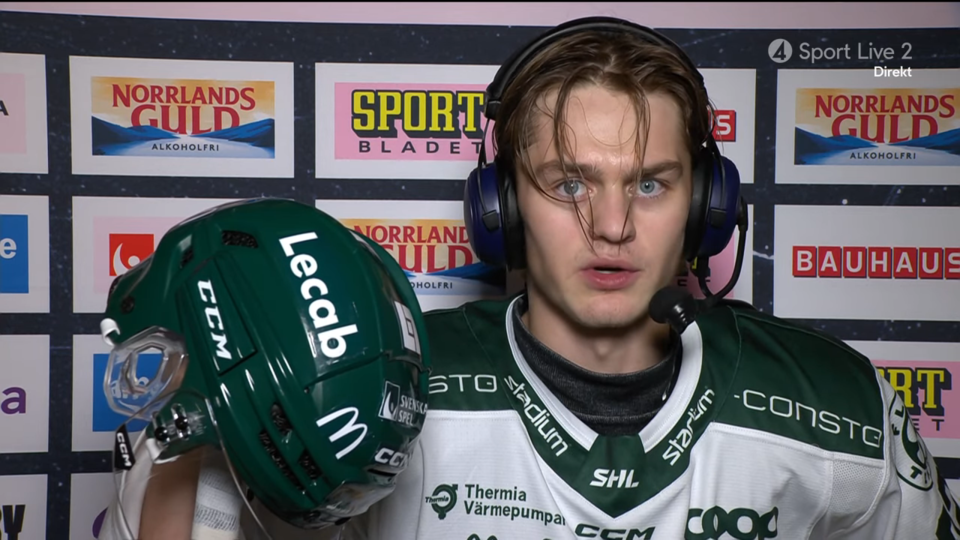The Vancouver Canucks' prospect pool just got a little bit more shallow.
On Sunday, the deadline passed for signing drafted prospects whose rights were expiring. After drafting a prospect, an NHL team keeps the signing rights for that player for a certain length of time: two years for prospects drafted out of major junior hockey in Canada, four years for prospects drafted out of Europe, and until a player finishes their college hockey career for prospects who go through the NCAA — usually up to four years.
The Canucks have already signed their last remaining prospect still in major junior hockey from the 2023 draft, Sawyer Mynio, so that wasn't a problem. They still had two prospects out of Europe from the 2021 draft, however, and neither was signed by the June 1 deadline. That means Lucas Forsell and Hugo Gabrielson are no longer part of the Canucks' organization.
That's not exactly a death blow to the Canucks' prospect pool. Both Forsell and Gabrielson were long shots to ever make the NHL, as they were drafted in the sixth and seventh rounds. Players drafted that late rarely make the NHL, and just one player drafted in the sixth or seventh round in 2021 has played any NHL games so far.
Still, at one point, both Forsell and Gabrielson seemed like solid bets, particularly Forsell.
The Forsell pick was an . For his first two post-draft years, it looked like the bet was paying off. The right winger produced well in the J20 Nationell, Sweden's top junior league, at 18-years-old, then made the jump to the SHL at 19. That season, Forsell led all junior-aged players in the SHL in goalscoring, tallying 11 goals in 35 games.
Forsell was starting to look like a legitimate steal as a seventh-round pick, with the potential to be a bottom-six energy forward, but then his development hit a wall. Instead of building on his 11 goals at 19, Forsell managed just 4 goals in 46 games the following year, then 4 goals in 46 games again the year after that.
That performance in the SHL at 20 and 21 makes it very unlikely that Forsell has any kind of NHL future, so it's completely understandable that the Canucks would refrain from using one of their 50 contract slots on him.
As for Gabrielson, , taking a chance on a player who produced well in junior, but didn't get the same opportunities to play in the top-tier men's leagues in his draft year.
A smooth-skating defenceman with some offensive upside to go with his well-rounded defensive game, Gabrielson , but he didn't do enough in Sweden to earn himself bigger opportunities. Four years after being drafted, Gabrielson is still in the second-tier HockeyAllsvenskan instead of the SHL.
That doesn't bode well for his potential to make the NHL, even though he produced a decent number of points for a young defenceman last season for the Nybro Vikings. His 26 points in 44 games last season led all under-25 defencemen in the HockeyAllsvenskan.
That surge in production wasn't enough to keep him in the Canucks' system, however, as the team let his signing rights lapse.
The Canucks currently have just two players remaining from the 2021 NHL Entry Draft that are still with the team. Second-round pick Danila Klimovich and fifth-round pick Aku Koskenvuo are currently with the Abbotsford Canucks on their playoff run in the AHL, though Klimovich has been a healthy scratch and Koskenvuo is the third-string goaltender behind Arturs Silovs and Nikita Tolopilo.
The Canucks will also have to make a decision about signing one more draft pick this summer. Jackson Kunz was their fourth-round pick from he 2020 NHL Entry Draft, and he just completed his fourth year at the University of North Dakota in the NCAA. He that included a professional tryout agreement for the current season, though he played in just one game with Abbotsford and has not dressed for any playoff games.
Kunz's NHL signing rights will lapse on August 15, but it seems unlikely that the Canucks will sign him to an NHL deal before then. Keeping him signed to an AHL deal will give them a chance to keep him close to the fold in case his game translates better to the professional game than it did to college hockey, where he had 15 points in 36 games last season.




